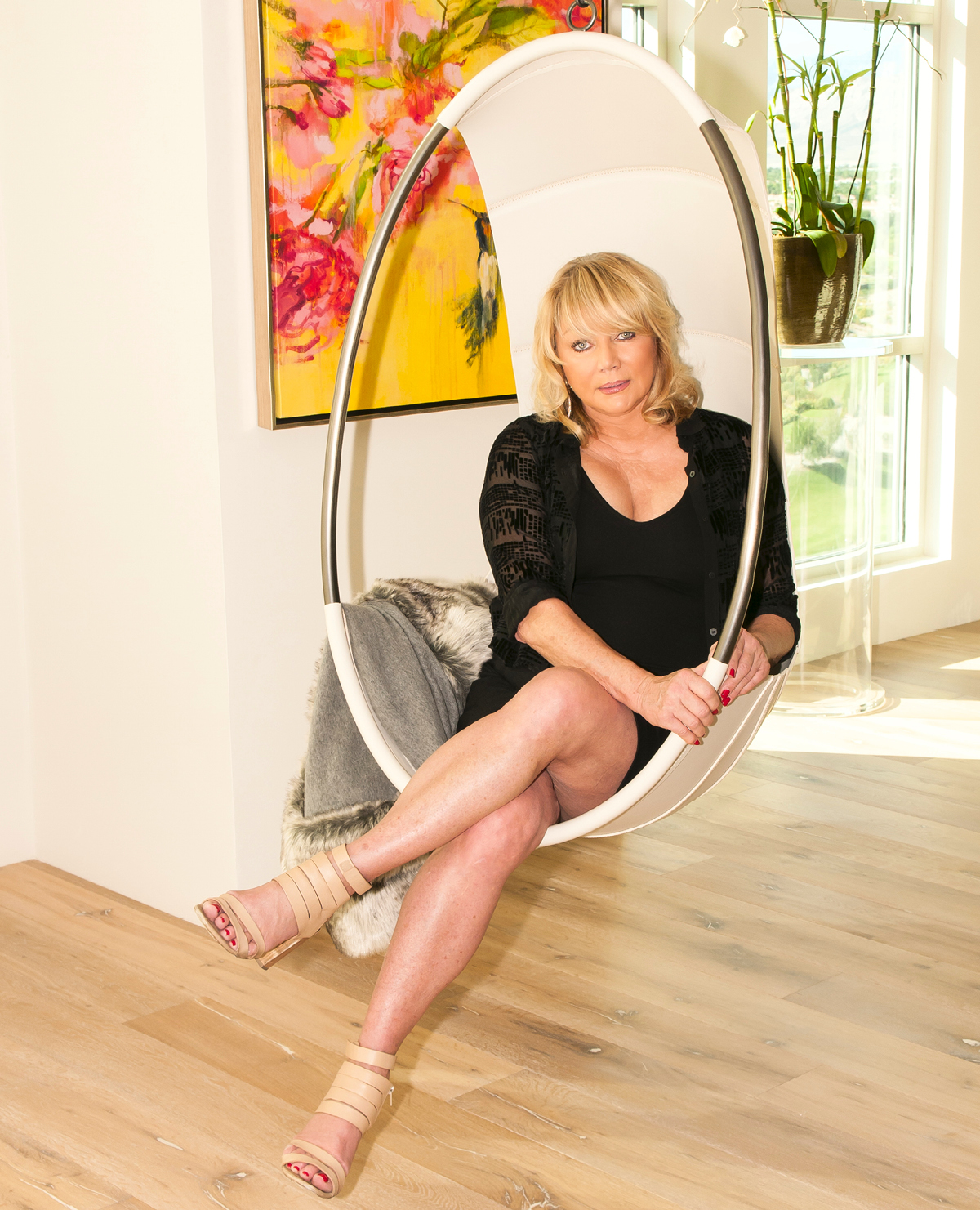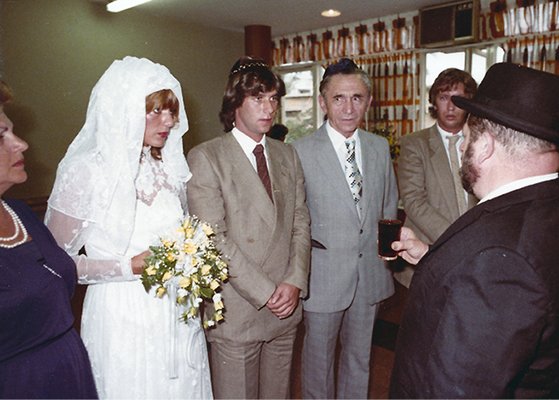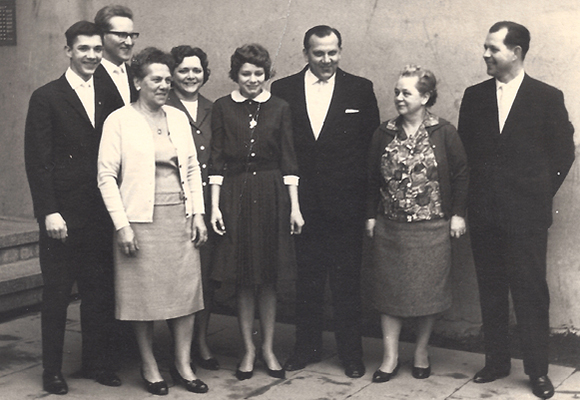Sins of Our Fathers

Karin Sporn photographed at her home in Las Vegas.
Many young post-World War II German gentiles are curious about the history of the Holocaust, the Jewish religion and the Jewish people. But the subject remains largely taboo – especially during family inquiries. It’s taught in schools, but specifics about the Holocaust are left vague, enabling the perpetrators’ to conceal their war crimes.
Young Germans generally have no idea what their parents, grandparents, aunts and uncles were involved in between 1933 and 1945. Often, approbatory speeches made about individuals at honorary celebrations and funerals fail to mention their roles during this period.
Karin Sporn, now a Las Vegas resident, was born in Germany shortly after the war ended, in a hamlet called Gronau, along the Dutch border. Her father worked for the German railway following his military service in the army. Her mother was an educator, earning her teaching credentials under the Hitler regime.
Karin was raised Christian and attended Christian school. She recalls the vibrant Christmas season, and the warmth and laughter that characterized family gatherings around the hearth. She used to recollect fondly her father’s Sunday morning command to assemble at the breakfast table – “Kompanie, Aufstehen” – a military expression meaning “Company, get up!” But her eventual awareness of her father’s connection to that expression sent chills up her spine.
As a young girl, Karin remembers her family struggling in a post-war economy. By the end of each month, a meal of potatoes was often their only sustenance. Her parents blamed America and the Jews for Germany’s misfortunes, and said life had been better under Hitler. They directed disparaging comments at the new State of Israel, and claimed Israelis were murdering poor Arabs on their own land.
Karin’s family moved to a bigger town as she entered her high school years. She found herself frustrated during history class when the teacher glazed over certain topics relating to the war. When she turned to her parents for answers, her mother got defensive and defiant. Her father twisted his face into a funny shape and made silly sounds.
Karin knew something was wrong and was determined to break up the silence and deception, to learn the truth: that just as much as Goethe and Mozart were, anti-Semitic hatred and genocide, and Aryan supremacy, was as integral to German history. Karin didn’t want to contemplate a future that failed to include a truthful account of the past.
DAVID sat down recently to learn more about Karin’s experiences.
DAVID: What prompted you to push through your family’s resistance?
SPORN: I knew that Jews and others were rounded up and murdered during the war, but I didn’t understand why. I wanted to know what my parents knew about it, and what role they, and Germany, may have played.
DAVID: What, in particular, unlocked the mystery for you and set you on your path to reject their ideology?
SPORN: I asked my parents a few profound questions: Didn’t they notice that people they knew, people living around them, were disappearing? Didn’t they wonder why they were prohibited from shopping in stores owned by Jews? Why did they not speak up?
DAVID: Their response?
SPORN: It was shameful and unfortunately a stereotypical answer given by many Germans living at that time. They were worried about what the neighbors would think! And, besides, America was to blame and the fate of the Jews was their fault — they brought it upon themselves.
DAVID: What does one do with a realization like that?
SPORN: Well, I still only had their side of the story. I had never even met a Jew in my life at that point. But one day I found some books my father was reading and among them was Mein Kampf (Adolf Hitler’s manifesto, meaning My Struggle, from which the atrocities of the Holocaust stem). I realized that my parents were pro-Hitler, very anti-Semitic, and that most Christians in Germany welcomed the rise of Nazism in 1933.
DAVID: Did this affect your religious beliefs and your faith in your family?
SPORN: Of course. It affected my belief in the church, not in G-d necessarily. When I saw photos of priests making the Hitler salute … when I learned that they did nothing to stop the murder of innocent people, I left the church. Religion is supposed to be about goodness and this was not goodness. I became an atheist. I moved out of my parents’ house to pursue my own life. I became a part of the new ‘flower child movement.’ I embraced the new ‘rock ‘n roll music.’ I moved in with my boyfriend, who had long hair. My father freaked out and said that these new ways never would have been allowed under Hitler.
DAVID: What set you on your journey to become Jewish?
SPORN: I broke up with my boyfriend and moved to Cologne. Nightclubs were popular and frequented by young people, myself included. As serendipity would have it, I met my future husband David, a Jew … the first Jew I ever met. He was charming, handsome, smart, and we fell in love. He was born in Jerusalem. His parents were German Jews who escaped the Holocaust as teenagers – having lost most of their family members – and moved to Israel. When David was 7 years old, they returned to Germany to open up two small hotels, with reparations they received from the German government.
DAVID: How did his parents feel about his dating a non-Jew?
SPORN: They sent him to Israel to meet a nice Jewish girl. But I followed him there. My first time in Israel. I was a bit scared because of the stories about the bad Israelis killing Arabs. But the moment the wheels of the plane touched the ground there were exuberant cries of joy. I started to cry myself for some reason. But the real life-changing experience happened when I checked into my hotel. The maid servicing the room was a German Jew and a Holocaust survivor. She showed me the tattooed number on her arm; that she was a twin and how Dr. (Josef) Mengele performed horrific experiments on them; she showed me her leg where a piece of bone was missing; and how her twin did not make it. Oh my G-d. How many more stories were there like this one? How could the German people – my parents among them – ignore this? I felt a responsibility to the 6 million voices that were brutally silenced.
DAVID: What steps followed for you in taking that responsibility?
SPORN: The serendipity continued. David took me to meet his aunt who lived in Kibbutz Kfar Giladi at the Lebanese border, and during the Lebanese civil war. We could hear the gunshots over the border. I got to see how ‘bad Israeli’ doctors and nurses treated wounded Lebanese Arabs. And most remarkably I was able to meet and speak with then Minister of Foreign Affairs Yitzhak Rabin, who was at the border meeting with Christian Lebanese leaders in support of their war effort. He told me all about the Holocaust. When David and I returned to Germany, I was a changed young woman. I enrolled in community college where I learned Hebrew and studied Torah with my philosophy professor. I understood then that I felt Jewish in my soul and wanted to convert to Judaism. This decision was independent of my relationship with David.
DAVID: How was it possible at that time in Germany to find a rabbi who could convert you?
SPORN: You’re right. I couldn’t. I had to return to Israel where a rabbi there put me on a program of study that I could do from Germany. The process took 2 ½ years, but I spent the last six months of that living full time with an Orthodox family in Israel in order to learn the daily life of an observant Jew. I passed my final test, mostly in Hebrew, with the then chief rabbi of Jerusalem. Shortly thereafter, David and I were married under a chuppah in Tel Aviv. I did not invite my parents, but we did have a small party with them when we got back to Germany. They were somehow in denial about my marrying a Jew — the same way they were in denial about the horrors of the Holocaust.
DAVID: What brought you to America?
SPORN: Our two daughters were born and, of course, raised Jewish. The whole family moved to San Diego for business in 1995 and moved to Las Vegas in 2005, where I immediately got involved with the Jewish community – in particular the Jewish Federation. I must make a difference. I cannot give back those 6 million lives, but through my daughters, granddaughters and their progeny; and through the time, efforts and financial contributions I can make to the Federation to improve the lives of Jews, and non-Jews, I hope that I am making a difference. I am especially passionate about enabling the proliferation of the Jewish people, so I have set up a fund to provide interest-free loans to Jewish families struggling to conceive, and who cannot otherwise afford the cost of fertility medicine. We can all make the future better. But it begins with taking the first step – speaking up!

Karin & David Sporn’s wedding, Tel Aviv, Israel, November 21, 1979

